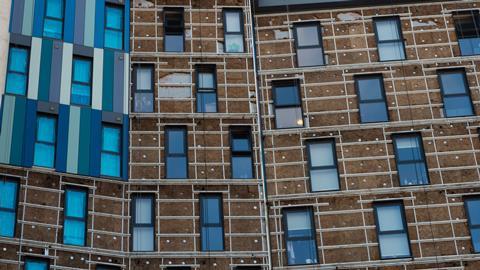There is a similar sense of politicians grasping at straws when you compare Australia’s attempts to deport Novak Djokovic and Michael Gove’s threat to make developers pay £4bn for recladding mid-rise housing blocks. Maybe the housing secretary formulated some of the policy while stuck in a BBC lift for half an hour.

I share the view of most Aussies in thinking the tennis world’s male number one was caught bang to rights when he tried to enter Australia in his quest for an historic 21st Grand Slam. But somehow state and federal politicians, tennis authorities and border agencies contrived to keep the Serb in limbo for 12 days. Prime minister Scott Morrison led the efforts to deport Djokovic – a stance supported by 71% of the public Down Under.
You’d never guess there was an election looming.
Could Gove’s proposed cladding levy have been made on the hoof to detract attention from Morrison’s simultaneously under-fire UK counterpart? You’d be forgiven for thinking so. When BBC engineers managed to extricate Gove, he failed to dispel that impression in his interview with Radio 4’s Today programme on 10 January.
For a start, he seemed to shift ground on just which sectors should contribute to the fund to pay for the recladding of unsafe residential buildings of 11m to 18m in height. A letter that day was addressed “Dear Residential Property Developer Industry”, making it clear that housebuilders alone were in the government’s sights – prompting falls of up to 5% in the biggest companies’ shares.
But during the interview with Nick Robinson, Gove intoned: “We now need to make sure that everyone in the development and in the construction product manufacturing sector who has a responsibility steps up to the plate.”
Ad hoc policies
In a sign this government can be just as ad hoc in policy implementation as Australia’s, Gove reminded Robinson that he had previously collared Mercedes Formula 1 boss Toto Wolff and persuaded him to drop cladding producer Kingspan – linked to the Grenfell Tower fire – as a sponsor. Similarly, he brought up the case of Rydon Homes, which he had banned from receiving Help to Buy support, due to it being in the same group (but very different in scope) to Rydon Maintenance, the lead contractor on the refurbishment of Grenfell Tower.
Releasing thousands of leaseholders from the initial proposal that they take out loans for remedial work might be a convenient diversion amid the flood of ‘party-gate’ revelations. Hence the urgency.

It would appear that Gove had approached chancellor Rishi Sunak to pay for the work, which would also make it easier for flat-holders to sell their homes. Despite being the most politically formidable figure in decades to have held the housing brief, Gove failed to extract new funding. So, he was faced with the choice of eating into the affordable housing budget or getting the industry to cough up.
The letter was more stick than carrot: “I am prepared to take all steps necessary [his emboldening], including restricting access to government funding, the use of planning powers, the pursuit of companies through the courts… the imposition of a solution in law if needs be.” This, he confirmed to Robinson, would be new taxes.
There’s absolutely no question that the government is doing the right thing to free leaseholders from their penury. But this looks a bit rich. A number of the biggest firms, led by Taylor Wimpey and Barratt, have already pre-emptively committed to paying close to £1bn for remediation of their own work. Few ‘mainstream’ housebuilders venture higher than 11m, yet those earning more than £25m a year were landed with a 4% residential property developer tax in Sunak’s October Budget to partly fund recladding of 18m-plus towers the government had previously committed to pay for. The actual builders of the offending towers may be difficult to pin down, given the complex ownership of some, often foreign, firms.
Then there’s the issue that developers were following Building Regulations, under the aegis of government. And the fact that – other than not getting their logos on Lewis Hamilton’s Merc – it’s questionable whether any cladding manufacturers will shoulder any cost.
But Gove has one excuse to rattle the can at housebuilders: Help to Buy. The equity loan initiative, most would agree, has been an important ingredient in their eye-watering profits since 2013. For this reason, rather than natural justice, it seems Barratt, Persimmon et al will continue to be, like the banks and energy companies, the government’s favourite ‘magic money tree’.
Alastair Stewart is an equities analyst and consultant





























No comments yet